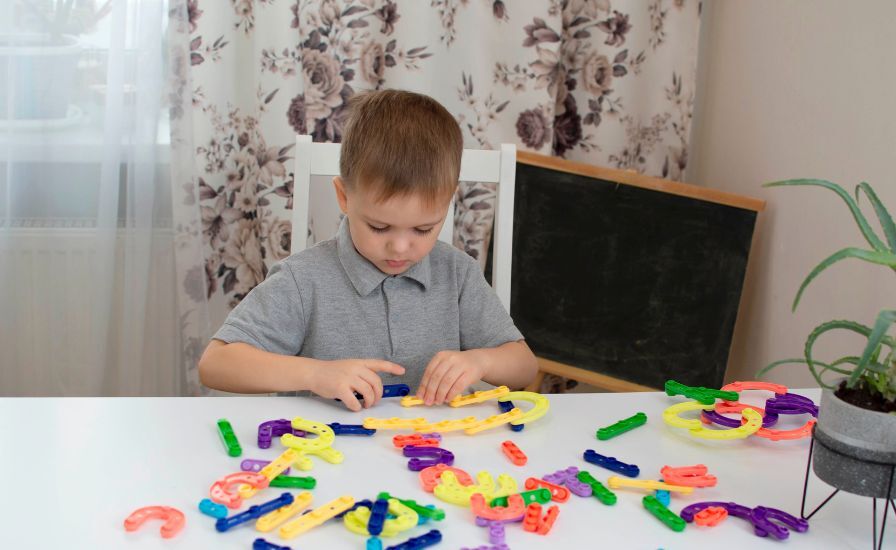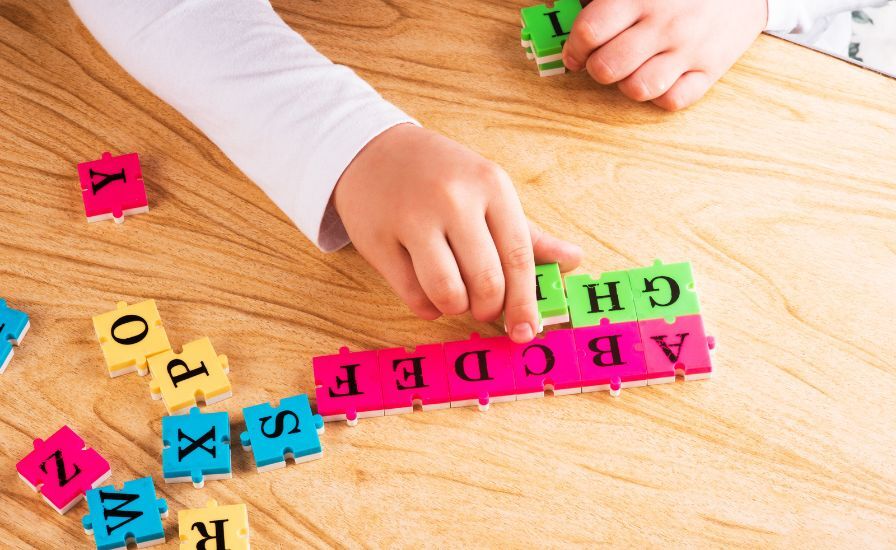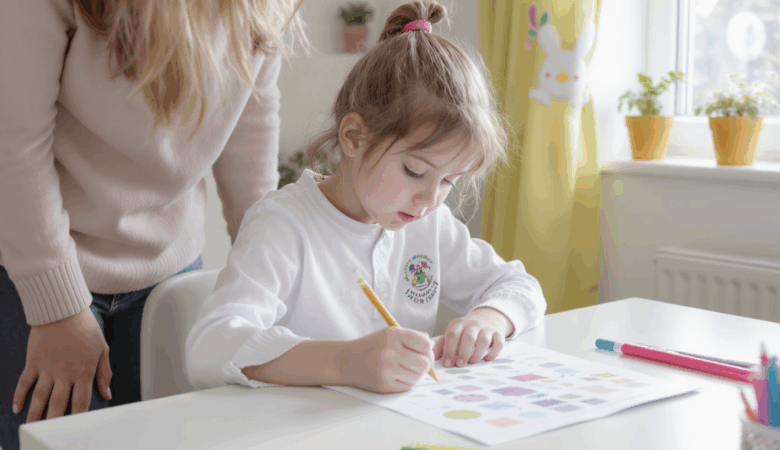Spelling can be a real barrier for children of all ages and even sometimes for adults too. When it comes to spelling, the English language can be really tricky as it is not phonetic. This detailed guide will provide you with a lot of useful tips and strategies about how to improve spelling by which you can easily help your child master the spelling of English words and become a pro and confident speller.

The Importance Of Spelling
Good spelling is not just about securing the top scores on your school’s test. It plays an important role in your child’s communication, literacy and their overall academic performance. It will boost confidence and help your child in expressing their thoughts clearly. Let’s get started and help your child understand the correct way to write, spell the words and make their learning experience fun and engaging.
1. Learn The Rules And Patterns
English spellings are full of conflicts and inconsistency. That is why the first step is essential which is learning the rules and patterns of it. You can prepare your child by starting with the basic rules like “I before E except after C”. This rule is designed to help you with the spelling of words where “i” and “e” appear together. It means that “i” should come before “e” unless the combination has the letter “c” in it. Here’s how it normally works:
Example:
“I before E”:
- Believe
- Friend
- Piece
“Except after C”:
- Receive
- Deceive
- Ceiling
Tip: Make sure that your child also learns the exceptions to these rules to avoid common mistakes.
2. Reading Regularly
Know that reading is an essential building block for your child’s spelling preparation. Motivate your child to read a wide range of genres so they can explore different words, writing styles and sentence structures.
Example:
- Your child should read classic and trendy novels.
- Make them explore poetry, plays and non-fiction.
Tip: Use reading workbooks that have examples, comprehension questions and creative writing exercises to make your child’s reading time more engaging.
3. Make Writing Your Child’s Habit
Understand that regular practise is the key to mastering spelling. Motivate your child to write regularly even if it’s just for 20 minutes. If you establish a regular writing routine for your child, it will greatly improve their spelling skills.
Example:
- Encourage your child to write daily like words, phrases or sentences.
- Keep a daily journal for your child to write in.
Tip: Daily remind your child to write to spark their creativity and inspire their writing.
4. Use Acrostics and Mnemonics
Acrostics and mnemonics are great memory aids for difficult words. They can make learning spellings fun and easier for your child to remember. An acrostic is a phrase where each letter stands for a word and a mnemonic is a tool that helps you remember information by connecting it with something easy to recall.
Example:
- Use acrostics for words like “necessary” ( to remember the single “c” and double “s”)
- Use mnemonics for words like “rhythm”. It’s like one collar for two sleeves (to remember the correct spelling)
Tip: Create fun and silly acrostics together to make tricky words less stressful for your child.
5. Break Words into Syllables
Breaking difficult words into small lingual syllables to help your child remember the sneaky, silent letters and tricky spellings.
Example:
- Wednesday: Wed-nes-day.
- February: Feb-ru-ary.
Tip: Teach your child to sound out the words by each syllable that they find difficult. You can also search for new words by yourself and help your child understand them by this method.
6. Sing the Letters Out Loud
Understanding the letters doesn’t have to be daunting. Adding a melody to a word’s spelling will make it easier for your child to remember the number of letters in the word. This technique is commonly used in UK spelling bees.
Example:
- Singing the letters of the word “beautiful” like B-E-A-U-T-I-F-U-L. (one by one)
Tip: Set aside a specific time for your child daily and use familiar tunes to create memorable spelling songs.
7. Promote Visual and Sensible Learning
Remember that visualisation is a powerful memory tool. Encourage your child to create relatable pictures of the words they are spelling.
Example:
- Like drawing a cat with a curving “C” to remember that “cat” starts with C not a K.
- Creating a story with words that have a vowel sound like “ea”
Tip: Use different types of strategies and be creative with them to fit your child’s learning style.
8. Use Spelling Apps
There are many apps to help with spelling that can make learning for your child fun and engaging. These apps offer different games, quizzes and exercises to improve the spelling skills of your child.
Example:
- Johnny Grammar’s Word Challenge.
- BBC Teach – Skillswise.
Tip: Include the use of these apps into your child’s daily routine to make their spelling practise enjoyable.
9. Play Spelling Games
Games are a great way to include spellings into your daily life. They make learning seem like a fun activity, not a task to complete.
Example:
- Scrabble or Boggle.
- Word searches and Hangman.
Tip: the best thing you can use is to put magnetic letters on the fridge to create words and spelling challenges for your child.
10. Use Flashcards
Flashcards are simple and one of the most effective tools for learning spellings. Write the word on one side and draw its picture or write its definition on the other side.
Example:
Flashcard for “accommodate”: showing two c’s and two m’s.
Tip: Ask your child to review the flashcards regularly to improve their memory.

11. Practise Makes Perfect
Remember that repetition is the key to mastering spelling. Boost your child to write down words multiple times to solidify their spelling skills.
Example:
- Write the word “necessary” five times.
Tip: Hide the word after multiple attempts and ask your child to try to write it from their memory.
12. Learn Plural Forms
Learning plural forms can be a little tricky for your child but is essential for good spelling. Teach your child the rules for creating plurals and their odds.
Example:
- Berry → Berries.
- Knife → Knives.
Tip: Use a handy guide like the Oxford Dictionaries article on plurals to help your child.
13. Improve Pronunciation
Mispronouncing words can lead to several spelling mistakes. Make sure that your child knows the correct pronunciation of words.
Example:
- Espresso (not expresso).
- Wednesday (not Wensday).
Tip: Break words into syllables to help your child with their pronunciation and spelling.
14. Write Regularly
Writing regularly in English is important to strengthen your child’s spelling skills. Look for opportunities for your child to write letters, essays, or even a small blog.
Example:
- Writing a letter to a friend
- Starting a daily journal.
- Writing fictional stories
Tip: Motivate your child to mark and write down any spellings they find difficult while writing.
15. Use Word of the Day Technique
If you want to know how to learn spelling words quickly then Use a word-of-the-day method. This technique introduces new words daily and helps your child build their vocabulary.
Example:
- Merriam-Webster’s English Learner’s Word of the Day.
Tip: Collect word-of-the-day words in a folder or write them on post-it notes and stick them around your house.
16. Spelling Competitions
Friendly competitions can motivate children to learn spellings. Challenge your child and their friends to participate in spelling bees or organise one at home.
Example:
- Weekly family spelling bee.
- Online spelling quizzes.
Tip: Make a list of tricky words so your child can study them before the competition.
17. Don’t Rely on Spellcheck
Spellcheck can be a helpful tool but it’s not foolproof. Teach your child to trust their own instincts and knowledge.
Example:
- “Four you” is incorrect vs. “for you” is correct to use.
Tip: Encourage your child to proofread their work before relying on spellcheck or anyone else.
18. Put Up Posters
Decorate your child’s room with multiple posters and flashcards of difficult words. It will help them in memorisation when they come across the posters regularly.
Example:
- Poster of words that people often misspell.
- Flashcards of the rules and patterns of spelling.
Tip: Create your own posters with your child and consider it a fun project.
19. Celebrate Progress
Acknowledge and celebrate your child’s achievements in spelling preparation. Your positive support will motivate their continued effort and improvement.
Example:
- Reward system for reaching their spelling goals.
- Sharing their work with family and friends.
Tip: Submit their work to writing competitions for external validation.

The Final Word
Becoming a pro is a journey not a one-day task and it requires a lot of time, effort and regular practise with focus. You can help your child in becoming a confident and expert speller by using the techniques mentioned above.
Remember that the key to how to improve spelling is regular practise, creative learning and a positive attitude. Use a mix of spelling preparation and engaging spelling words exercises to help your child.
Happy spelling!










Leave a Reply